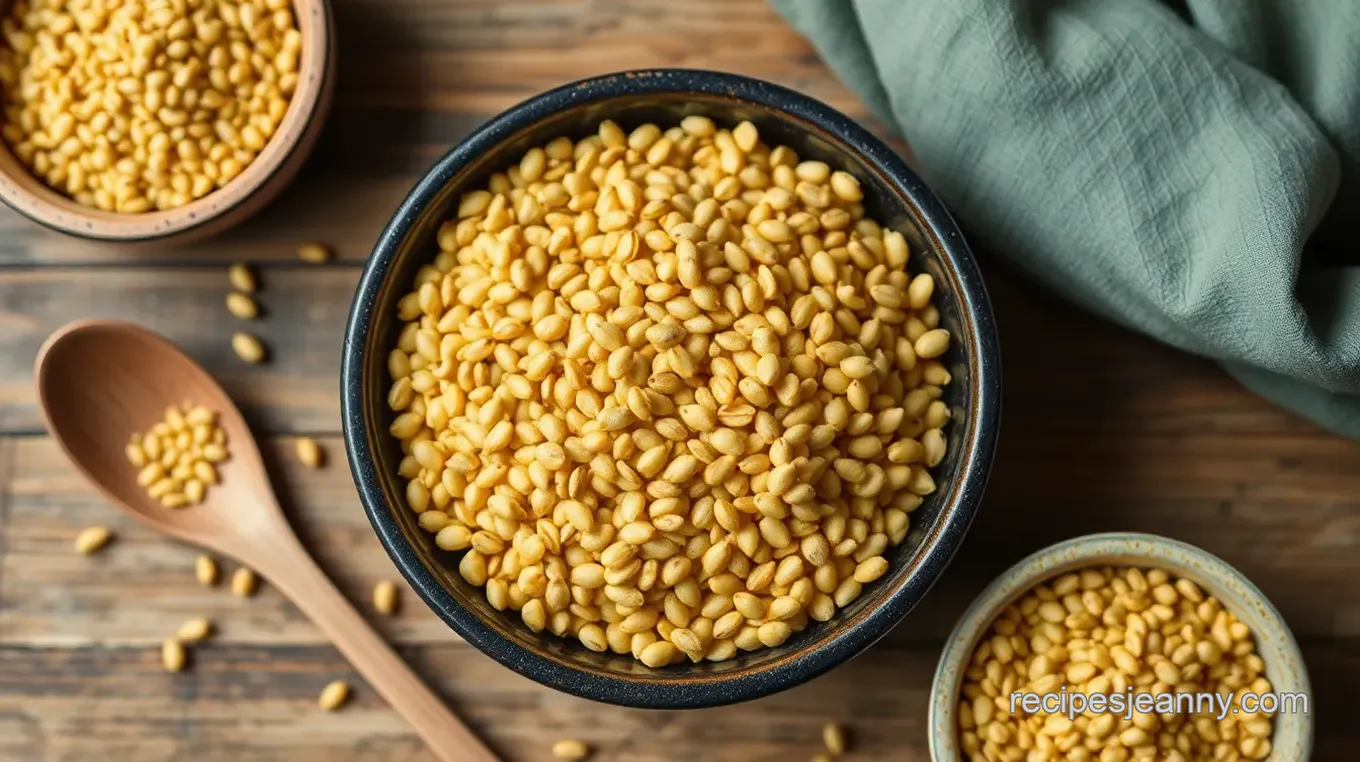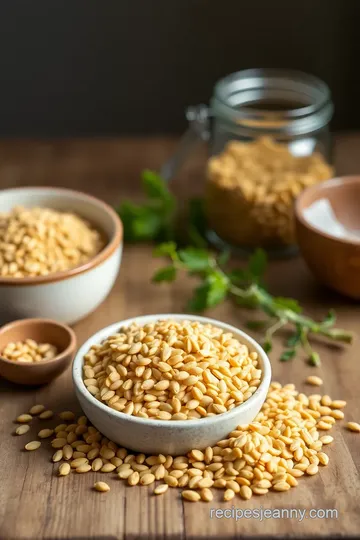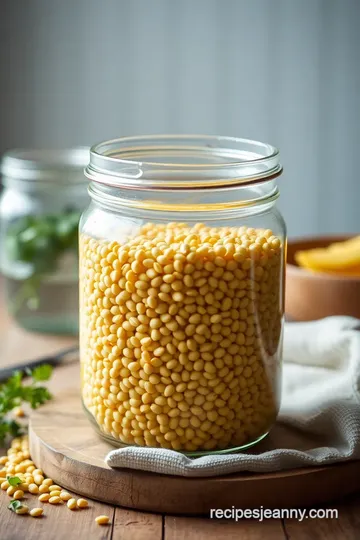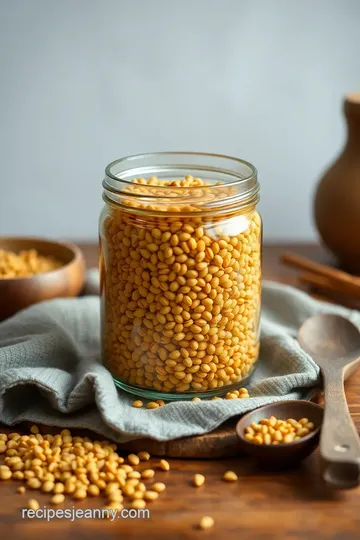Gut-Friendly Fermented Fenugreek Seeds
Discover the benefits of Fermenting Fenugreek Seeds for Gut Health! My easy recipe enhances flavor and boosts digestion. Check it out now!

- Let’s Talk Fermentation: A Journey with Fenugreek Seeds
- Recipe Overview: Easy Peasy Fermented Fenugreek Seeds
- The Good Stuff: Benefits of Fermenting Fenugreek Seeds
- Making the Leap: Transitioning to Ingredient Time
- Essential Ingredients Guide
- Mastering Professional Cooking: Your Journey to Gut Health with Fermented Fenugreek Seeds
- Pro Tips & Secrets for Fermenting Fenugreek Seeds
- Perfect Presentation
- Storage & Make-Ahead
- Creative Variations
- Complete Nutrition Guide
- Frequently Asked Questions
- Recipe Card
Let’s Talk Fermentation: A Journey with Fenugreek Seeds
You know that moment when a random ingredient catches your eye at the grocery store, and you just have to learn more about it? well, that was me with fenugreek seeds! one day, while perusing the aisles, i stumbled upon these little wonders, and now i'm all about fermenting fenugreek seeds for gut health .
Honestly, if you haven’t tried it yet, you’re missing out. think about it—something that jazzes up your meals and brings a wealth of gut health benefits ? sign me up!
So, have you ever thought about why fermented foods have become such a big deal lately? turns out, it's not just a trend! they have deep roots in culinary history, especially in places like india, where fenugreek is a staple.
People have been using these seeds for centuries, not just for their distinct flavor but also for the health benefits of fenugreek .
Fast forward to today, and we folks are diving into the world of fermented foods more than ever. and with a solid fermentation technique, you can easily whip up something delicious, gut-friendly, and pretty spectacular.
Recipe Overview: Easy Peasy Fermented Fenugreek Seeds
Alright, let’s break this down. the whole process is super straightforward. you’re looking at just about 15 minutes of prep time and then letting nature do its thing for 2 to 7 days .
After that? boom! you’ll have around 1 cup of fermented fenugreek seeds to enhance your snacks or salads. oh, and the best part? it’s an easy healthy recipe that won’t break the bank.
Seriously, just a cup of fenugreek seeds, some water, and a pinch of salt. it’s cost-effective, too, yielding bountiful flavor without the extra expenses.
The Good Stuff: Benefits of Fermenting Fenugreek Seeds
Let’s get to why you should consider this! first off, fenugreek seeds are a powerhouse. packed with nutrients, these tiny seeds can aid in digestive health , boost metabolism, and even help control blood sugar levels.
By fermenting them, you're not only enhancing their flavor but also increasing their nutritional value . it's like reinventing a classic dish but with a health boost!
But wait, there’s more! fermented foods are bursting with probiotics , those good bacteria that do wonders for your gut.
If you ever feel bloated or just ‘off,’ adding fermented foods like these seeds can be one of those natural gut remedies.
Picture this—serving them at your next gathering can add a unique touch and spark up conversations about healthy eating without sacrificing taste.
You can toss them in salads or mix them in yogurt for a zesty dip. who doesn’t love a bold flavor enhancement?
Making the Leap: Transitioning to Ingredient Time
So, are you ready to take the plunge into the world of fermentation? i can tell you firsthand it’s fun, rewarding, and, let’s be honest, a little cool to impress your friends.
Trust me, they’ll be asking, “how did you make this?” and you get the chance to explain those old-school fermentation methods and how some soaking fenugreek seeds can lead to something spectacular!
Before we jump into the ingredients, keep in mind that keeping your setup clean is key, especially when dealing with homemade fermented vegetables .
Keep your jars and utensils squeaky clean to avoid unwanted bacteria. i can’t stress that enough! also, don’t shy away from experimenting.
Maybe add some garlic powder or a sprinkle of cumin before fermenting; the options are endless and can turn your dish into something truly special.
Ready to get your hands dirty? Next up, let’s dive into what you’ll need to get started on your gut-friendly fermented fenugreek seeds journey!

Essential Ingredients Guide
Hey there, food lovers! let’s talk about two things that bring excitement to our kitchen: quality ingredients and some essential know-how to use them.
You know the feeling when you open your spice cabinet and stare at all those jars, wondering what to reach for? yeah, we’ve all been there! so, let’s break it down.
Premium Core Components
First off, let’s get down to the nitty-gritty of premium core components . It’s all about knowing your ingredients well.
When buying spices, having the right measurements is crucial. whether you’re using us cups or the metric system , getting it right helps ensure your dish comes out just like you imagined.
For example: 1 cup fenugreek seeds (250g) gives you the perfect punch of flavor and health benefits. speaking of which, look for quality indicators —fresh, vibrant colors, and a clean, aromatic smell.
If your spices smell more like cardboard than the earth, put them back on the shelf.
Storage guidelines can make or break a spice's life span. keep them in airtight containers and stash them away from sunlight.
Most dried spices, including our star here, fenugreek, can last about 2–3 years if stored properly. but for the best flavor and nutrition , i suggest using them sooner rather than later.
Signature Seasoning Blend
Now, let’s get spicy! finding the right signature seasoning blend is just like having a secret weapon in your cooking arsenal.
Try mixing cumin , coriander , and a pinch of turmeric for a warm flavor that works like magic with roasted veggies.
The herb selections can take it up another notch; dill and cilantro pair beautifully. feeling adventurous? switch things up with regional variations like mexican or italian seasonings .
There’s a world of flavors waiting!
To enhance flavors, don’t forget about aromatics like garlic and onion. those babies pack a punch and are essential in many dishes.
Keep in mind that some spices are gut-friendly too! spices like fenugreek not only bring flavor but also offer incredible gut health benefits .
If you're curious about healthy snack ideas, toss some into your trail mix!
Smart Substitutions
Alright, what's a cook without some quick fixes? ever run out of an ingredient mid-recipe? smart substitutions come to the rescue! if you're low on fenugreek seeds, you can switch to mustard seeds for a similar taste.
Also, if you need a way to make dishes healthier, consider alternatives like using coconut oil instead of butter.
And let’s be real, we all go through times when dietary restrictions come into play. whip up some delicious homemade fermented vegetables instead! people swear by natural gut remedies for a boost in digestive health.
Kitchen Equipment Essentials
You got your ingredients covered, but what about your tools? it’s going to be hard to stir up a storm without the right kitchen equipment essentials .
A good fermentation jar setup is a must if you’re diving into fermenting fenugreek seeds for gut health . your standard glass jar works just fine.
Don’t forget a fine mesh strainer for rinsing seeds, and invest in a solid wooden spoon for stirring.
When it comes to preparing your space, keep everything clean, ya know? it's about minimizing unwanted bacteria during fermentation. make sure to have a notepad handy for notes on your fermentation journey.
Trust me, you’ll want to remember what worked and what didn’t for next time!
Wrapping It Up
So there you have it! an essential guide to gearing up your kitchen game. with the right ingredients, spices, and tools, you’re set to whip up some fermented dishes that not only taste amazing but also give your gut some love.
Whether you're whisking up some special blended spices or perfecting your fermentation techniques , you're on the right track to creating delicious, gut-friendly meals.
Ready to try out those easy fermentation recipes ? you’re gonna love it! let's dive into the step-by-step instructions and make those tantalizing fermented fenugreek seeds come to life!

Mastering Professional Cooking: Your Journey to Gut Health with Fermented Fenugreek Seeds
Cooking can sometimes feel like a high-stakes game, especially when you're aiming for that restaurant-level quality at home. but fear not! with the right professional cooking methods, you can whip up amazing meals while boosting your gut health with fun recipes like fermenting fenugreek seeds for gut health .
Let’s break it down, shall we?
Essential Preparation Steps
First things first, let's talk mise en place . this french term simply means “everything in its place.” before you even think about cooking, have all your ingredients and tools ready to go.
For our recipe, that means having your 1 cup of fenugreek seeds , 4 cups of filtered water , and your jar all set up.
Trust me, it makes a world of difference when you’re scrambling to soak those seeds.
Time management is crucial too! set a timer for 8 hours for soaking your seeds. this may sound simple, but tons of cooks forget to prep their ingredients on time, which can lead to last-minute chaos.
No one likes rushing, right?
Organization strategies are your best friend. keep your workspace clean and clutter-free. i once tried to cook in a messy kitchen and ended up knocking over a jar of spices.
Talk about a disaster! seriously, you want your kitchen vibes to be zen.
Safety considerations are key as well, especially when you're working with fermentation. make sure your equipment is squeaky clean to avoid any risky bacteria.
Always wash your hands before diving into food prep, people!
Step-by-Step Process
Okay, now onto the nitty-gritty. Here’s a simple step-by-step breakdown:
- Rinse and Soak: First, rinse 1 cup of fenugreek seeds under cool water. Soak them in 4 cups of filtered water for about 8 hours .
- Drain: After soaking, drain the seeds. Use a fine mesh strainer to make this easy.
- Prepare for Fermentation: Toss the soaked seeds back into your clean glass jar, sprinkle in 1 teaspoon of sea salt , and mix.
- Ferment: Cover the jar with a lid or cheesecloth. Let it sit at room temp, around 68° F to 75° F ( 20° C to 24° C) , for 2 to 7 days . Check daily for that perfect tang.
- Store: Once you're satisfied with the flavor, pop those seeds in the fridge to halt fermentation.
Remember, timing is everything! Those fermented seeds are not just tasty; they’re full of gut health benefits.
Expert Techniques
Let’s talk expert techniques. always taste as you go! this isn’t just for fun—it's crucial to ensure you're achieving the right flavor profile.
Some people over-ferment and end up with seeds that taste like vinegar. yikes!
Critical steps? Consistency is key. Ensure you check those seeds daily, and keep notes on timing. Want to tweak it next time? You'll have the info right at your fingertips.
Quality checkpoints are also a must. If the seeds look slimy or smell off, toss them out. You’re going for flavors that enhance your dishes, not ruin ’em!
Troubleshooting tips? If your seeds aren’t fermenting as expected, try warmer locations or check the salt ratio. Sometimes, it’s that simple!
Success Strategies
Now, let’s avoid some common mistakes. Don’t overdo it on the salt; too much can hinder fermentation. And keep everything clean—dirty hands can spoil your batch.
Quality assurance tips? Always smell and taste those seeds before diving in. If they don’t smell right, skip it!
Want perfect results? Refrigerate your seeds as soon as they hit your desired taste, stopping the fermentation process.
And if you’re a planner, opt for make-ahead options. Fermented foods like fenugreek seeds can stay fresh for weeks in the fridge and are fantastic when mixed into salads with gut-friendly ingredients or as toppings on soups and stews!
Additional Information
So here we are, gearing up to deepen our culinary journey while embracing health benefits. the flavors and the joy of homemade fermented vegetables can truly enhance your meals.
Plus, the nutritional value of fenugreek seeds? through the roof! you're adding probiotics and fun flavors—all in one.
Fermenting fenugreek seeds for gut health is just the beginning! keep exploring with different fermented dishes , and don't shy away from mixing spices to create your own unique flavors.
Happy cooking, friends!

Pro Tips & Secrets for Fermenting Fenugreek Seeds
Hey there, fellow food lovers! so, i’ve been diving deep into the wonderful world of fermenting fenugreek seeds for gut health , and trust me, it’s a journey you’ll want to take! along the way, i've picked up some pretty handy tips that’ll make your fermentation adventure smooth sailing.
First things first, cleanliness is key . make sure all your tools are squeaky clean—think boiling water or even a quick wipe with some vinegar.
This helps ward off any unwanted bacteria that might crash the party.
Wanna save time? here’s a little secret: prep double batches! you’ll thank yourself later when you have delicious fermented foods ready to go.
And let me tell you, there’s nothing like the taste of homemade fermented fenugreek in salads or smoothies!
Want to kick up the flavor? try adding spices for gut health ! a little cumin or coriander goes a long way in making your fermented seeds truly pop.
Then there are the natural flavoring options , like garlic or chili. i'm telling ya, they add a zing that’ll do your taste buds proud.
And don’t just toss those seeds into a jar and forget about them. presentation matters ! arrange them in a cute bowl or on top of your dishes for that instagram-worthy shot.
Your friends will be guessing where you learned all of this!
Perfect Presentation
Okay, it’s time to flaunt those fermented fenugreek seeds!
When plating, think about color combinations . Your dish is a canvas, so why not get creative? The bright yellow of turmeric-infused seeds against the greens of a fresh salad? Pure magic!
For garnishes, keep it simple but effective! a sprinkle of fresh herbs, like cilantro or dill, can add a refreshing pop.
If you’re working on salads or wraps, throw on some fermented seed toppings —they not only look good but they also offer that satisfying crunch.
Honestly? your dishes will never look the same!
Storage & Make-Ahead
Now, let’s chat about how to keep these beauties fresh. store your homemade fermented vegetables in an airtight container in the fridge.
They’ll typically last about two weeks—but i bet you’ll eat them up before then!
When it comes to reheating, I recommend enjoying them cold or room temperature to keep those gut health benefits intact. If you must heat them, do it gently.
Feeling prepped? Make them ahead! Just remember—fermentation time can vary based on your kitchen’s vibe. A hotter spot? The seeds will ferment quicker.
Creative Variations
Why stick to the same old, same old? the possibilities are endless with recipes with fenugreek seeds ! try a seasonal twist by adding roasted pumpkin in the fall or fresh fruits in the summer.
Got dietary restrictions? no problem! you can easily substitute fenugreek seeds for mustard seeds for a different flavor. it’s all about experimentation and finding what works for you, so don’t be afraid to get a little wild in the kitchen.
Complete Nutrition Guide
Let’s break it down: the nutritional value of fenugreek is pretty impressive! they’re high in protein and fiber, making them perfect for snacking or as an add-on to meals.
This little seed does wonders for your digestive health and is packed with antioxidants.
In terms of portion guidance, I’d say about a tablespoon of fermented dishes per serving is a good start. You can always adjust up or down based on your personal health goals.
Not to mention, fenugreek has been linked to several health benefits —from reducing inflammation to possibly helping in blood sugar control.
You know, it’s comforting thinking about how one tiny seed can pack such a powerful punch!
So there you have it, a whole new world of easy healthy recipes with fermenting fenugreek seeds for gut health ! i hope you’re as jazzed as i am to dive into these fermented delights.
Trust me, once you start, you’ll be hooked! it's such a cool way to boost your health while having fun in the kitchen.
Embrace the process, experiment a bit, and don't forget to share your own experiences. Happy fermenting, my friends! You’ve got this!
Frequently Asked Questions
What are the health benefits of Fermenting Fenugreek Seeds for Gut Health?
Fermenting fenugreek seeds enhances their digestibility and increases their probiotic content, which is beneficial for gut health. These seeds can help improve digestion, reduce inflammation, and support healthy gut bacteria, offering a delicious way to incorporate probiotics into your diet.
How long does it take to ferment fenugreek seeds?
The fermentation time for fenugreek seeds can vary between 2 to 7 days, depending on the ambient temperature and your desired level of tanginess. It's best to check the seeds daily, as warmer temperatures can speed up the fermentation process.
Can I use other types of seeds instead of fenugreek for fermentation?
Yes, while this recipe focuses on fenugreek seeds, you can substitute them with mustard seeds for a different flavor profile. Just keep in mind that the fermentation time and taste will differ slightly.
What are some ways to use fermented fenugreek seeds in my dishes?
Fermented fenugreek seeds make a flavor-packed addition to salads, smoothies, or as toppings for various dishes. You can also mix them into yogurt for a tangy dip or spread them on whole grain bread for a nutritious snack.
How should I store fermented fenugreek seeds for maximum freshness?
After fermentation, store the seeds in an airtight container in the refrigerator to halt the fermentation process and maintain their freshness. They can typically last up to two weeks in the fridge but should be consumed sooner for the best flavor and benefits.
Are there any dietary considerations with fermented fenugreek seeds?
Fermented fenugreek seeds are low in calories and high in fiber, making them a great addition to a healthy diet. However, those with certain allergies or intolerances should ensure they can tolerate fenugreek, as it may affect some individuals. Always consult with a healthcare provider if you're unsure.
Gut-Friendly Fermented Fenugreek Seeds Card

⚖️ Ingredients:
- 1 cup fenugreek seeds (250g)
- 4 cups filtered water (950ml)
- 1 teaspoon sea salt (4g)
- Optional: spices for flavor (e.g., cumin, coriander, or garlic powder)
🥄 Instructions:
- Step 1: Rinse fenugreek seeds under cool, running water.
- Step 2: In a bowl, soak the seeds in filtered water for 8 hours or overnight.
- Step 3: After soaking, drain the seeds using a fine mesh strainer.
- Step 4: Transfer the soaked seeds back to a clean glass jar. Add 1 teaspoon of sea salt and mix well.
- Step 5: Cover the jar with a lid or cheesecloth to allow airflow while keeping out contaminants.
- Step 6: Leave the jar at room temperature (68°F to 75°F/20°C to 24°C) for 2 to 7 days, checking daily for desired sourness.
- Step 7: Once fermented, transfer to the refrigerator to halt fermentation and use as desired.
Previous Recipe: Easy No Bake Pretzel Chocolate Delight: A Sweet and Salty Treat
Next Recipe: Easy & Flavorful Slow Cooked Mixed Legumes with Hearty Flavor: A Comforting Family Favorite
